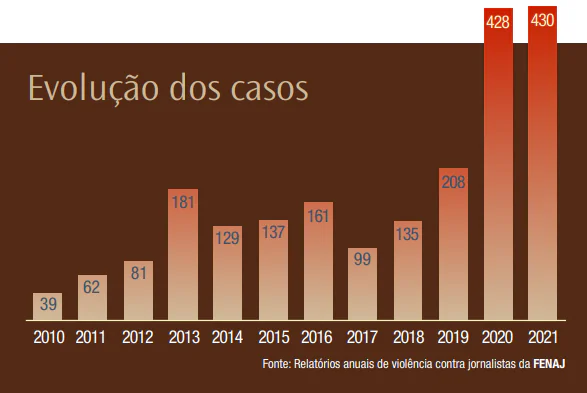The National Federation of Journalists (Fenaj) and the Observatory of Journalistic Ethics (objETHOS) published a report about violence against journalists in Brazil. About the topic, I remember some things:
"I'm gonna jeopardize you, jeopardize your carreer, you will lose all that you have. Get ready!"
"Why are you and your newspaper are chasing me all the time? Don't you have the corage to speak what you wrote in my face? Let's go resolve this man to man!"
Two politicians from Santa Catarina told me this after news and reports with complaints against them. These were the attacks against me that I remember. But I received many other attacks, indirect and worse: from local representants, local governments who asked for my resignation in newspapers that I worked. They didn't ask directly, but they pushed pression newspapers directors against my reports. They never had the corage to speak to me directly, first.
I've been asked not to write about some topics that I was searching about. After that, I discovered the real problem. Another time, a friend politician advised me to have caution about complaints of corruption against an entrepreneur. "Be careful, because this man is a gangster".
The violence against journalists registered
The cases written above was ocurred between 2006 and 2016, when I worked with journalism in Brazil. Nowadays, the situation is worse. Acoording to Fenaj/objETHOS report, until 2018, the Fenaj did not register more than 200 cases per year. In 2019, we had 208 cases. Between 2020 and 2021, the numbers jumped to 428 and 430 respectively.

The Bolsonaro factor
In the graphic above, we have an evidence that the situation got really worse in Bolsonaro administration. In three years of Bolsonaro we had 1066 cases against 1024 in the last nine years. The president of Brazil is the biggest aggressor, with 147 cases.
The secont biggest aggressor against journalism is a surprise for me: the EBC (Brazilian Communication Company), responsible for products like TV Brasil, Agência Brasil. And why is a communication company, despite being public, the second? Because the censorship is the most common type of violence, with 47% of violence cases.
But the censorship, of course, does not only occur in public companies. Most media in Brazil are financially dependent on the government, whether municipal, state or federal. And there's domestic censorship too. Enterpeuners of communication has others interest besides the journalism.
Other types of violence against journalists
Discrediting and verbal attacks appear next in the most recorded cases of violence against journalists. Obviously, physical violence are more uncommon, but each recorded are scary. Finally, we have threats and intimidation, like the two cases mentioned at the beginning of this article.
Another serious violence against journalists is the precariousness of the profession. This is a serious problem, which may not be professional information and also as a form of violence against the population, which has the right to information.
Low wages, informality, hiring like MEI, workload far above normal and exploitation beyond the hours contracted, a situation that is aggravated in the pandemic. How is a journalist going to take the risk, clashing with the powerful, if he doesn't even have the minimum conditions to do a good job?
Outputs
The Fenaj/objETHOS report brings some proposals to improve the situation of Brazilian press professionals, with measures to be taken by companies, journalists, public prosecutors and the three branches of government (Executive, Legislative and Judiciary).
Having a more united professional category can be the first step for the category to be able to put pressure on other actors.